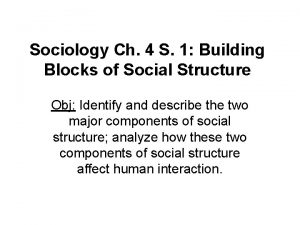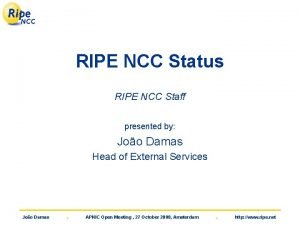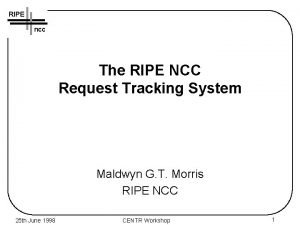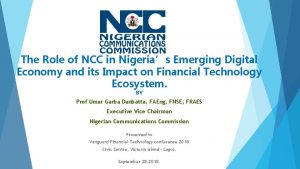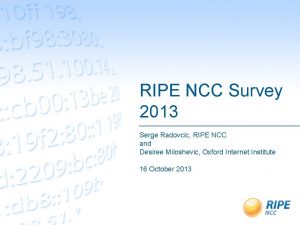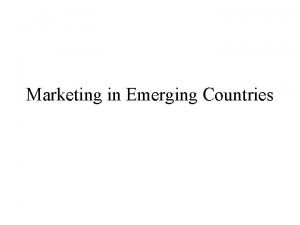The Role of NCC in Nigerias Emerging Digital

















- Slides: 17

The Role of NCC in Nigeria’s Emerging Digital Economy and its Impact on Financial Technology Ecosystem. BY Prof Umar Garba Danbatta, FAEng, FNSE, FRAES Executive Vice Chairman Nigerian Communications Commission Presented to Vanguard Financial Technology conference 2018 Civic Centre, Victoria Island - Lagos. September 28, 2018.

OUTLINE Introduction Nigeria's Financial Emerging Digital Economy Technology Ecosystem NCC’s Roles in Enhancing Digital Financial Inclusion in Nigeria Conclusion and Recommendations 1

Introduction The Nigerian Communications Commission (NCC) is empowered by the Nigerian Communications Act (NCA 2003) and is responsible for, amongst other things, creating an enabling environment for competition among operators in the industry and ensure the provision of qualitative and efficient telecommunications services throughout the country. Generally, NCC is responsible for the economic and technical regulation of the communications industry. As a regulator of a very dynamic industry, the NCC is aware of the ever changing trends in technology. Without doubt, the telecommunications sectors has grown since 2001 and has witnessed an unprecedented positive impact on other socioeconomic sectors in the country. The entry of mobile telecommunications technology has berthed transformation to sectors such as; banking, insurance, ecommerce, trading, aviation, pension, entertainment, education, e-health, eagriculture, etc. with various other services riding on the mobile telecommunications technology in Nigeria. 3

Introduction cont’d Following the speed of exponential change experienced in the industry, traditional form of communications is fast fading out; the state of affairs is for service providers to ensure provision of services aside voice to meet with the huge potentials associated to the consumer’s needs for internet based services. As service providers opt for new business models, regulatory and tax authorities need to be mindful of these changes as it is their responsibility to monitor and track them for further benefits. 4

Introduction cont’d Growth in communication markets is driven by demand and, in many jurisdictions, adaptive regulatory frameworks spur competition, innovation and investment. The dynamic innovative growth experienced in the Nigerian mobile telecommunications technology ecosystem which can be linked the availability of infrastructures and enabling technologies, informed various entities within this ecosystem to conceptualize ideas or high level abstractions, develop products and services and capabilities that enable digital economic services. In otherwords, the insistence of the NCC to ensure that the telecommunications infrastructure is continually upgraded, expanded and made robust to enhance amongst other things the delivery non telecoms services have translated into driving of a digital economy in Nigeria. 5

What is Digital Economy “Digital Economy” Simply put, is a catchphrase for all forms of economic transactions, exchanges and activities that are based on digital technologies. The digital economy is more broadly based on any of the many digital tools used in today's economic world. Putting into perspective, the scale of contributions that digital technologies have made to economies, the term “digital economy” can be fairly broad, many have used it in different ways to describe tech-based economic activity and trends. When speaking about the digital economy, many people are pointing to disruptions and market transformations based on digital technologies. However, a holistic overview of converging trends, policy developments on both supply and demand sides, digital economy can be seen as a form of digital transformation that impacts the socio-economic development of a nation. 6

Financial Technology Ecosystem Underpinned by digitization, interconnection and the growing ecosystem of digital technologies, digitalization is transforming our economies and societies by changing the ways people interact, businesses function and innovate, and governments design and implement policies Financial Technology (FINTECH) is any technology that is being used in the financial services industry. According to the ITU, Fintech is a term that refers to the companies providing software, services, and products for digital financial services: often used in reference to newer technologies. Some of these processes are exclusive of traditional financial institutions, prompting Paul Gillin to say, they are indicative of the growing disruptive power of the so called “fintech” companies, which apply cloud computing, social media, mobility and deep analytics to create new financial products and services. They fall under the category of Ideas or high level abstractions relevant to digital financial services for financial inclusion. They play 7 a very important role in in driving digital financial

NCC’s Roles in enhancing Financial Technology Ecosystem 1. Ensuring the provision of accessible digital and critical infrastructures and services: Digital infrastructures, including efficient, reliable and widely accessible broadband communication networks and services, data, software, and hardware, are the foundations on which the digital economy is based. It is essential that governments promote investment in digital infrastructures and competition in the provision of high-speed networks and services, ensuring that key complementary enablers are in place, e. g. fibre optic backhaul, sufficient spectrum 2. SIM Registration: SIM is an acronym for Subscriber Identification Module, is basically a smart card that stores data such as: user identification, user location, phone number, network authorization data, personal security keys, contact lists and stored text messages, etc. Furthermore, it is mandated by Law that every SIM must be registered before it is activated on any network as spelt out in the NCC SIM Registration Regulation 2011. visit NCC website for further details. 8

NCC’s Roles in enhancing Financial Technology Ecosystem The SIM card offers an opportunity to individuals who lack formal identification documents to access digital financial services. i. e. KYC challenge. It assists Law Enforcement Agents to combat SIM-related crimes. It provides a platform to access more digital SIM-enabled services irrespective of the provider. [With one SIM you can access multiple digital financial services] 3. Collaboration and active participation in the digital financial services ecosystem. 4. Actively involved in the actualization of the federal government’s financial inclusion target of 20% exclusion by the year 2020. 9

Challenges 1. Low Education/Literacy: Fintech firms are in a vantage position to help bridge some of the identified gaps such as gender, formality, age, urban/rural, etc. to attaining financial inclusion in Nigeria. However, a big challenge is the issue of low education/literacy across formal and financial sectors, hence the rationale for the high rate of exclusion within the youths and women in certain regions. There’s no gainsaying that Fintechs can improve access to finance for all ofconsumers, whether they are first time bank account owners, orlearning to save or invest or transact digital business. types However, there is need to address/tackle the challenge of financial literacy from the perspective of provision of new products and services that are designed for different cadres of literacy. Failure to tackle this challenge will continue to fuel resistance to use of Fintech services by the existing excluded persons. 10

Challenges Cont’d 2. Technical Hurdles And Policy Challenges: In addressing contending issues arising from Blockchain Technology, a technology that enables transactions without any trusted party. Bitcoin, for example, a virtual currency based on Blockchain Technology, which operates independently of any Central Bank Or Financial Institution. Much of the potentials from this technology still hinges on grappling with technical hurdles and policy challenges such as how to enforce law in the absence of any intermediary or how and to whom to impute legal liability for breaches caused by Blockchain-based systems 11

Challenges Cont’d 3. Artificial Intelligence And Big Data Analysis: Artificial intelligence (AI) enables machines to perform humanlike cognitive functions. According to one report by Vanson Bourne, about 80 percent of the companies sampled which include Fortune 500 companies are actively using one or more elements of AI, including machine learning and natural language processing, big data and cloud computing, algorithms that can identify increasingly complex patterns in large data sets and outperform humans in some cognitive functions. While promising gains in efficiency and productivity, AI is a driving force behind most Fintechs disruptions, which makes it a game-changer for small businesses and startups that are coming up within this field. The AI playfield is fraught with obstacles that keep the best of AI away from most small businesses who are clueless about the technology to legacy systems that won’t support the technology. 12

Challenges Cont’d a Also, AI may amplify the issues of data protection, considering that data is machines, have become the most important prerequisite for developing AI systems. Accessibility to the large amount of unstructured data [Unstructured data xtual ed poolis any understood AI intelligent anwhat an limits greatly system, which by system can do]. As well as, the sensitivity of data privacy and security. E. g. the Facebook data saga. As it is no longer acceptable to harvest data from the internet or CRM databases going through eachdataset to makesureit’s. AI-digestibleanddoesn’t violate any regulations. The noteofcautionhere, istounderstandthe challenges ahead as a vital key to succeed for the future. 13

Recommendations The digital transformation is progressively challenging every aspect of the economy and society, requiring many different policy areas to be considered simultaneously in an integrated approach and forcing governments to reach across traditional policy silos and across different levels of government to develop a whole-ofgovernment vision and strategy, therefore to ensure optimal delivery of services by Fintechs, there is need for immediate consideration of unbundling and restructuring of provision of financial services by relevant authorities. 14

Conclusion The digital transformation does not occur in isolation; it is shaped by, and contributes to shaping, the broader economy and society as a whole. Supporting policies play an important role in guaranteeing conditions for it to thrive. Open trade and investment regimes create new avenues for rapidly upgrading technologies and skills, and increasing specialization. Well-functioning labour markets can support the inevitable structural change. More broadly, sound macroeconomic policies help reduce uncertainty and create an enabling environment for the digital economy to grow. The NCC shall continue to ensure high level of Quality of Service, security assurance of networks, information and data protection. Likewise it shall ensure a level playing field for interconnectivity and innovation hosting on telecommunications technology for the common good of the nation. 15

General References. I. III. IV. V. VIII. https: //www. boj. or. jp/en/announcements/press/koen_2016/data/ko 161118 a. pdf Defining, Conceptualising and Measuring the Digital Economy RUMANA BUKHT & RICHARD HEEKS 2017 OECD (2017), OECD Digital Economy Outlook 2017, OECD Publishing, Paris. http: //dx. doi. org/10. 1787/9789264276284 -en Fin. Tech – Its Impacts on Finance, Economies and Central Banking Remarks at the University of Tokyo Bank of Japan Joint Conference in Tokyo on "Fin. Tech and the Future of Money“ - November 18, 2016 ITU Digital Financial Services (DFS) �Glossary Technical Report 2018 Howard Goldstein [https: //www. business. com/articles/fintech-startup-ai-adoption/] State of Artificial Intelligence for Enterprises by Teradata [http: //assets. teradata. com/resource. Center/downloads/Analyst. Reports/Teradata_Report_AI. pdf] Picture: Courtesy Google pictures 16

17
 Emerging role of financial manager in india
Emerging role of financial manager in india Azure worker role
Azure worker role Krappmann symbolischer interaktionismus
Krappmann symbolischer interaktionismus Statuses and their related roles determine the structure
Statuses and their related roles determine the structure Ncc status
Ncc status New city college
New city college Fire resistance level ncc
Fire resistance level ncc Ncc business permit
Ncc business permit Perbedaan nuc dan ncc
Perbedaan nuc dan ncc Types of ground ncc
Types of ground ncc Myncc portal login
Myncc portal login Webmail metu
Webmail metu Https://ncc-efm.org/game/efmgame.cfm
Https://ncc-efm.org/game/efmgame.cfm Ncc street lighting
Ncc street lighting Ncc trade cred new
Ncc trade cred new Hanbo engineering & construction
Hanbo engineering & construction Mail rtt monitoring
Mail rtt monitoring Kerr database
Kerr database



